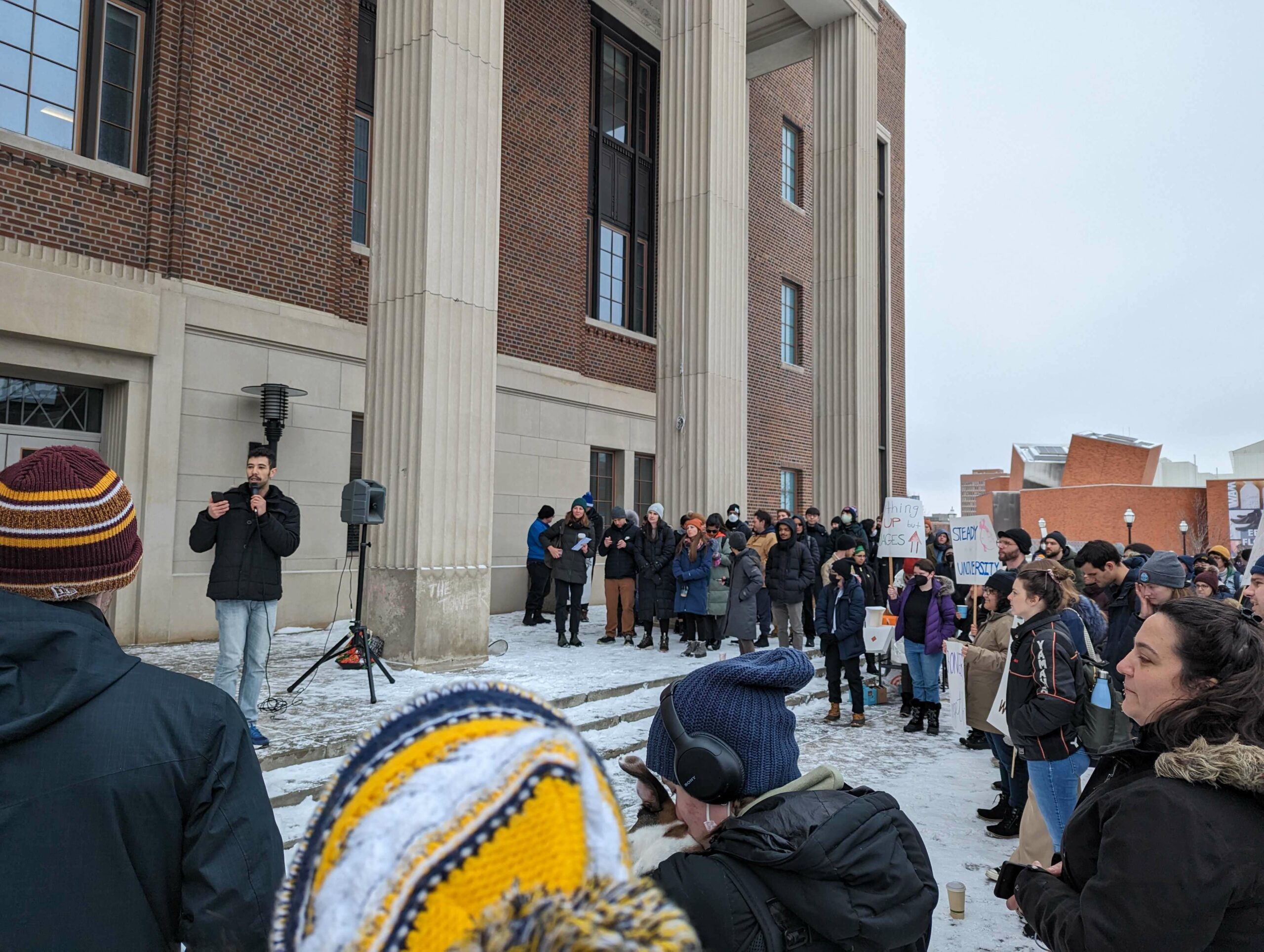On Monday, February 20, over 300 graduate student workers and their supporters gathered in front of Coffman Memorial Union on the Minneapolis Campus of the University of Minnesota to formally announce their union campaign. The University of Minnesota effort, which has been underway for over two years prior to their public announcement, follows in the wake of recent organizing wins by graduate student workers at Yale and University of Southern California, as well as an ongoing strike at Temple University. If successful, 4000 University of Minnesota graduate student workers would form the UMN Graduate Labor Union (UMN-GLU), affiliated with United Electrical, Radio and Machine Workers of America (UE).
What are Graduate Student Workers?
While in a course of study, graduate students commonly work as research or teaching assistants in exchange for tuition and a (meager) wage. University presidents and their anti-union spokespeople will be eager to inform you that graduate assistantships are intended to serve as temporary education experiences, training the student for their future career in academia—not providing them a sustaining job. As permanent faculty jobs have dried up and doctoral students graduate into fields where hundreds of graduates must fight over the same half dozen jobs nationwide, the idea that temporary poverty can be tolerated in service of a future career falls flat. Instead, we find a great deal of the teaching and research of many universities being performed by a group of highly skilled workers paid far less than a living wage and with an uncertain future. At the University of Minnesota, a graduate student union would cover over 4000 workers!
Why should we care?
Most socialists don’t require a lot of explanation for why they should support a union, a worker self-organization against the ruling class is foundational to our vision of change. That said, there are those who might question the strategic value of graduate students to the working class fight—after all, many of the stereotypes leveled against the socialist left (overeducated liberal young people from privileged families) are leveled against graduate students as well. And a shutdown of chemistry recitations doesn’t sound like the choke point of the economy that we might hope to find in an Amazon Warehouse? Is this a fight DSA should join to shore up our support among 24 year olds who read Marx and have an ironic tattoo? The answer, in this author’s opinion, is yes!
While graduate student workers may not be a game changer for DSA in terms of our engagement with working class politics, their position as a large labor force within a state institution has powerful potential. The University of Minnesota, like all institutions of higher education, has seen a pattern of disinvestment, privatization, and financialization over the past 50 years that coincides with the neoliberal turn of politics. While we can’t ignore the racist and sexist admission policies and connection to colonial land policies that formed the 19th and 20th century public higher education movement, it has also been a source for enlightenment and advancement for millions of working class people, as well as a rare public good that has enriched communities in countless ways.
Here in Minnesota, we feel this turn through dramatically raised tuition, decreased state support, student debt, and the 2005 closure of General College (which enrolled the most racially diverse and working class cohort of students). We also see it in higher education labor where employees at all levels have received sub-inflationary raises for decades, and where workers are either asked to do more with less or are replaced by precariously employed adjuncts or graduate students, or even private contractors. In recent years, state politics have devolved into a familiar pattern.When Republicans are in power, they do what they can to shrink the university:railing against bloat and a few notable high salaries (ignoring the vast majority of employees paid well below private sector norms), they freeze tuition and demand efficiency studies and cuts. Democrats at the helm do little more—they see themselves as collaborative partners to the corporate-friendly University Presidents, allowing them to raise tuition and build a new building or two while failing to look under the hood of how the University treats its workers and the working class of the state.
It would be too much to expect the graduate workers of the University of Minnesota to reverse this tide alone, but it’s also hard to imagine us reversing it without them. The GLU would join AFSCME and Teamsters as the third major union on campus. A successful campaign might also bode well for the thousands of faculty, adjuncts and professional staff, who unsuccessfully attempted to unionize in the mid-2010’s. An organized Higher Education workforce that’s capable of working directly with students and community and political leaders to reimagine public education has the potential to break the stalemate currently enforced by austerity-minded conservatives and business-minded administrators. What’s at stake is not only their own livelihoods and the ability for people who aren’t independently wealthy to even consider graduate study, but the shape of the University as a whole.
What comes next?
Initial signs of the union’s support are encouraging, with estimates that nearly half of eligible workers had signed a card within 48 hours of the campaign’s launch. That said, as we’ve seen with Starbucks and Trader Joe’s Unions, dominant showings in a union election don’t mean that the fight is over. The victories the workers need have to be won at the bargaining table—and on the picket line. The union is asking supporters to email their state representative and senator to increase pressure on the university administration to recognize the union. You can follow them on Twitter or Instagram @umnglu to stay informed of future actions and updates.
More Information:
Minnesota Reformer “University of Minnesota graduate students announce union drive”
The Dig podcast “Higher Ed Industrial Unionism w/ Donna Murch and Todd Wolfson
Racket “New U of M Graduate Labor Union Could Unionize 4,000 Jobs”
By Ian R

